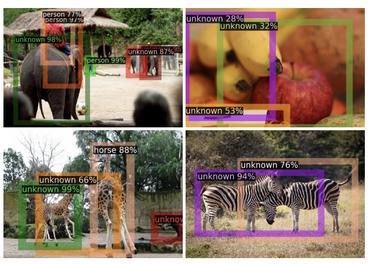Random Boxes Are Open-world Object Detectors
We show that classifiers trained with random region proposals achieve state-of-the-art Open-world Object Detection (OWOD): they can not only maintain the accuracy of the known objects (w/ training labels), but also considerably improve the recall of unknown ones (w/o training labels). Specifically, we propose RandBox, a Fast R-CNN based architecture trained on random proposals at each training iteration, surpassing existing Faster R-CNN and Transformer based OWOD. Its effectiveness stems from the following two benefits introduced by randomness. First, as the randomization is independent of the distribution of the limited known objects, the random proposals become the instrumental variable that prevents the training from being confounded by the known objects. Second, the unbiased training encourages more proposal explorations by using our proposed matching score that does not penalize the random proposals whose prediction scores do not match the known objects. On two benchmarks: Pascal-VOC/MS-COCO and LVIS, RandBox significantly outperforms the previous state-of-the-art in all metrics. We also detail the ablations on randomization and loss designs. Codes are available at https://github.com/scuwyh2000/RandBox.
PDF Abstract ICCV 2023 PDF ICCV 2023 Abstract




 MS COCO
MS COCO
 LVIS
LVIS